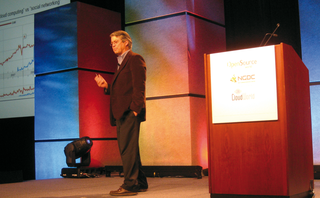
By Jono Bacon
This week I took the 20-minute BART ride from the East Bay over to Moscone West in San Francisco to visit what was once known as LinuxWorld and is now OpenSource World, Next Generation Data Center, and CloudWorld all rolled into one event. Having been to previous LinuxWorlds, I was curious to see how this re-branding and grouping of events would pan out. LinuxWorld had been getting quite the panning (no pun intended) over the last five years or so, so could the new event cut the mustard and reel back in its once committed group of sightseers?
The combined event certainly offered a lot. Three events and many simultaneous tracks of content across the three sub-events were combined with an exhibition that also combined the three primary interests of the show - open source, data management, and the cloud. The show boasted some strong names within the industry, with such heavyweights as the always excellent Robert "r0ml" Lefkowitz and Larry Augustin, Brian Aker, Tarus Balog, Lew Tucker (Figure 1), Brian Gentile, Luke Kanies, Stormy Peters, Bill Weinberg, and Winston Bumpus. I was there to do a panel discussion on "Desktops and Netbooks" and deliver a talk called "The Evolution Of Inclusion."
The value of the talk content at the event was of course dependent on what each attendee was interested in, but I was impressed with the range of topics. The facilities for the talks were good, with few technical and A/V hitches, and everything seemed to run on time. This event was definitely more Buzzword Compliant than other events, largely because of the audience: a heavy attendance of business people, buyers, and analysts. For that demographic of attendees, the content seemed appropriate.
For many people, including myself, the exhibition area is a key attraction at an event such as this. It is where we get to see new technology, meet and greet new people, and expand our knowledge of products and services in the industry. The exhibition was strangely only open for a limited time, which seemed a good idea to allow those staffing exhibition booths to maximize their time between exhibiting and attending talks, but many of us would have preferred to have meandered in the exhibition area more. The exhibition was also smaller than previous LinuxWorlds, which was a surprise, given that the event was a combination of three events: I would have expected it to be larger. A reasonable range of vendors were present, but many key vendors and companies were noticeably missing.
Like many shows, an area is provided in which non-profit, volunteer-led upstream open source projects can exhibit for either free or a nominal fee. The .org area at the event was disappointingly pushed right out of the way of the exhibition to the back of the room, in a separate room with no line of sight to the other exhibitors. In this room, the open source projects were provided with a run-of-the-mill circular table and chairs.
I found this a frankly embarrassing and degrading nod toward open source projects. Many of these projects form the backbone on which an event such as this can prosper, and event manager IDG needs to afford them more respect than was rustled up for this show. I was not alone in this view either; a large number of exhibitors not only were disappointed that the .org projects were shoved to the back of the venue but were keen that their commercial exhibits be in line of sight with the .orgs to promote more cross-pollination and discussion.
Come on IDG, you can do better than this. Despite some of these issues, a quick straw poll of exhibitors seemed to find the exhibition useful and a positive use of their time, particularly for the cloud-focused companies.
Overall, although the exhibition was useful, some of the talk content was interesting, and the event was certainly well put together, I came away feeling that the event was a pretty average show overall. With so much competition in the conference circuit, I would far rather throw my conference dollars at shows such as SoCal Linux Expo, Ohio Linux Fest, or OSCON for open source--focused content or CloudCamp for cloud-related content. Interestingly, although many of these events are led by volunteers, they certainly equal, and in most cases surpass, OpenSource World in terms of content and quality.
I do believe IDG could deliver unique value in OpenSource World, but I didn't pick up on it this time around, and I genuinely hope that if they have an event next year, it delivers something unique for the demographic of the industry it is targeting.